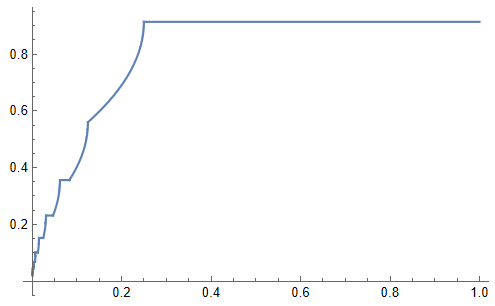Suppose that $f$ satisfies $a$-Hölder condition on $[0,1]$ ($0<a<1$). Fix $0<b<a$. For any $x\in [0,1]$ and sufficiently small $\delta>0$, is the following inequality established? $$ \int_0^\delta t^{-1-b}|f(x-t)-f(x)| \, dt \leq C\delta^{-b}\sup_{0<h\leq \delta}|f(x)-f(x-h)|, $$ where $C$ does not depend on $x$ and $\delta$.
1 Answer
$\newcommand\ep\varepsilon\newcommand{\de}{\delta}\newcommand{\De}{\Delta}$This inequality does not hold in general, even if the function $f$ is nondecreasing, which will be assumed henceforth.
Indeed, then the inequality in question is $L\ll R$, where \begin{equation*} L:=\int_0^\de dt\, t^{-1-b}[f(x)-f(x-t)],\quad R:=\de^{-b}[f(x)-f(x-\de)], \end{equation*} and $A\ll B$ means that $A\le CB$ for some real constant $C>0$ depending only on $f$. We also write $A\asymp B$ to mean that $A\ll B\ll A$. We assume throughout that $0<\de\le x\le1$.
Note that \begin{equation*} R=r(f;x,\de):=\de^{-b}\int_{x-\de}^x df(s) \end{equation*} and \begin{equation*} \begin{aligned} L&=\int_0^\de dt\, t^{-1-b}\int_{x-t}^x df(s) \\ &=\int_{x-\de}^x df(s)\int_{x-s}^x dt\, t^{-1-b} \\ &\asymp\int_{x-\de}^x df(s)\,[(x-s)^{-b}-x^{-b}] \\ &=l(f;x,\de)-(x/\de)^{-b}r(f;x,\de), \end{aligned} \end{equation*} where \begin{equation*} l(f;x,\de):=\int_{x-\de}^x df(s)\,(x-s)^{-b}. \end{equation*} So, the inequality in question, $L\ll R$, can be rewritten as \begin{equation*} l(f;x,\de)\ll r(f;x,\de). \tag{1}\label{1} \end{equation*} Since $(x-s)^{-b}\ge\de^{-b}$ for $s\in(x-\de,x)$, we see that the inequality $l(f;x,\de)\ge r(f;x,\de)$, opposite to \eqref{1}, actually holds. Moreover, since the factor $(x-s)^{-b}$ explodes to $\infty$ as $s\uparrow x$, \eqref{1} seems unlikely to hold.
So, to disprove \eqref{1}, it seems reasonable to let $f$ grow faster in a left neighborhood of $x$. Indeed, for $\ep\in(0,\de)$, let the function $f_{x,\ep}$ be defined by the conditions $f_{x,\ep}(0)=0$ and \begin{equation*} df_{x,\ep}(s)=ds\,(x-s)^{a-1}\,1(x-\ep\le s<x). \end{equation*} Then the function $f_{x,\ep}$ is $a$-Hölder-continuous, \begin{equation*} l(f_{x,\ep};x,\de)\asymp\ep^{a-b},\quad r(f_{x,\ep};x,\de)\asymp\de^{-b}\ep^a, \tag{2}\label{2} \end{equation*} so that $l(f_{x,\ep};x,\de)>>r(f_{x,\ep};x,\de)$ if $\ep<<\de$; we write $A<< B$ or, equivalently, $B>>A$ to mean that $A=o(B)$. (Do not confuse $<<$ and $>>$ with $\ll$ and $\gg$.) This is not quite a counterexample to \eqref{1}, though, since the function $f_{x,\ep}$ depends on the varying $\ep$.
However, it is not hard to modify this idea to get a genuine counterexample to \eqref{1}. To do so, in what follows let $f$ be the function defined by the conditions $f(0)=0$ and \begin{equation*} df(s)=\sum_{j=2}^\infty df_{2^{-j},2^{-j}/j}(s). \end{equation*}
Then $f$ is nondecreasing (obviously) and $a$-Hölder-continuous. Indeed (cf. \eqref{2}), \begin{equation*} \int_{2^{-j-1}}^{2^{-j}} df(s) =\int_0^1 df_{2^{-j},2^{-j}/j}(s)\asymp(2^{-j}/j)^a \tag{3}\label{3} \end{equation*} and $\sum_j(2^{-j}/j)^a<\infty$, so that $f$ is continuous at $0$ and hence on $[0,1]$. Also, $f$ is constant on $[2^{-2},1]$. So, to check that $f$ is $a$-Hölder-continuous on $[0,1]$, it suffices to check that $f$ is $a$-Hölder-continuous on $(0,2^{-2}]$.
To do so, suppose that $0<x<y\le2^{-2}$. Then there exist integers $j$ and $k$ such that $2\le k\le j$, $x\in\De_j:=(2^{-j-1},2^{-j}]$, and $y\in\De_k$.
If $k=j$, then \begin{equation*} 0\le f(y)-f(x)=f_{2^{-j},2^{-j}/j}(y)-f_{2^{-j},2^{-j}/j}(x) \\ =\frac{g_j(x)^a-g_j(y)^a}a\le\frac{(y-x)^a}a, \end{equation*} where $g_j(x):=2^{-j}-\max(x,2^{-j}-2^{-j}/j)$, so that $f$ is $a$-Hölder-continuous on $\De_j$.
If $k=j-1$, then the intervals $\De_j$ and $\De_k$ are adjacent to each other. Since $f$ is continuous on $[0,1]$ and $a$-Hölder-continuous on each of the intervals $\De_j$ and $\De_k$, we see that $f$ is $a$-Hölder-continuous on $\De_j\cup\De_k$. So, \begin{equation*} 0\le f(y)-f(x)\ll(y-x)^a \tag{4}\label{4} \end{equation*} if $k\ge j-1$.
If now $k\le j-2$, then, in view of \eqref{3}, \begin{equation*} 0\le f(y)-f(x)\le\sum_{i=k}^j\int_{2^{-i-1}}^{2^{-i}} df(s)\ll(2^{-k})^a, \end{equation*} whereas $y-x>2^{-k-1}-2^{-j}\asymp2^{-k-1}\asymp2^{-k}$. Thus, \eqref{4} holds whenever $0<x<y\le2^{-2}$, which completes the verification that $f$ is $a$-Hölder-continuous on $[0,1]$.
Finally, using \eqref{2} with $x=2^{-j}$, $\de=2^{-j-1}$, $\ep=2^{-j}/j$, and $j\to\infty$, we get $\ep<<\de$, \begin{equation*} l(f;x,\de)=l(f_{x,\ep};x,\de)\asymp\ep^{a-b}, \end{equation*} and \begin{equation*} r(f;x,\de)=r(f_{x,\ep};x,\de)\asymp\de^{-b}\ep^a, \end{equation*} so that $l(f;x,\de)>>r(f;x,\de)$, as claimed. $\quad\Box$
Here is the graph of $f$ for $a=1/2$:

